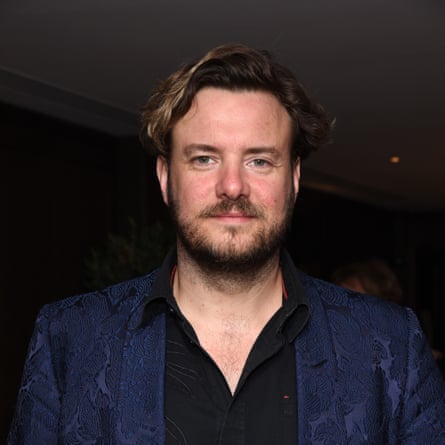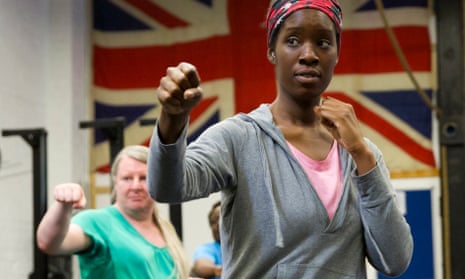A woman repeatedly punches David Cameron in the head, or at least an effigy of him. In slow motion, its smiling features distort under her blows. Elsewhere, a homeless man is slowly sinking into the pavement outside a corporate office block. A disturbed janitor with a headful of rightwing propaganda brings a shotgun to his school. Volunteers dispense care and supplies at a foodbank in a coastal town. A Bolivian cleaner shouts to the oblivious office workers around her: “Am I invisible?”
These are probably not the images of modern Britain that Theresa May had in mind when she announced a celebratory Festival of Brexit back in late 2018, but as a state-of-the-nation snapshot, they speak volumes. They are all from The Uncertain Kingdom, an anthology of 20 short films made last year. The films vary widely in subject and tone, from surreal comedy to hand-sketched animation. But recurring themes emerge: xenophobia, loneliness, identity, class and poverty. The overall mood could not be described as festive – apprehensive, more like. Is this really who we are? Or should that be, who we were? Thanks to Covid-19, The Uncertain Kingdom already has a time-capsule quality to it.

The so-called Festival of Brexit (now scheduled for 2022), was the direct inspiration for The Uncertain Kingdom, explains its instigator, John Jencks: “I was in the bath listening to Radio 4. It was November 2018, and there was an announcement about a post-Brexit festival that would bring us all together again and make us feel so proud of being British. And I groaned .” Like many Britons, Jencks, a producer and director best known for his film adaptation of Stephen Fry’s The Hippopotamus, was not convinced the time was yet ripe for “bringing us all together”. “Actually we needed to do quite a lot of shouting. And a lot of sighing,” he says. “But I thought the idea of a cultural response to this very febrile moment was utterly important.”
Jencks called on two producer colleagues, Georgia Goggin and Isabel Freer, and they set up a fund to commission 20 shorts, with a budget of £10,000 each. Some film-makers were invited directly, and there was an open call for proposals that received more than 1,100 applications. There were no rules, but each film had to “make an argument about Britain”. The aim was less to present a coherent work than a diversity of perspectives. “We started to compare ourself with exhibitions, such as Sensation,” says Jencks, citing the controversial 1997 British art show.
The objective was not to provoke controversy per se, but seeing the results, and the conspicuous absence of flag-waving national pride, it is no great stretch to anticipate criticisms of “doing down Britain” or pursuing a “lefty agenda”. Britain’s creative communities are generally progressive, and despite the producers’ efforts to bring more right-leaning film-makers on board, political “balance” was always going to be a challenge. “There are celebratory, joyous moments in a lot of the films. They’re not uniformly negative,” says Jencks. “They don’t use the idea of Britishness as a punching bag. They are critical of Britain and our times and where we find ourselves, maybe because the idea of Britishness is so oblique.”
The Uncertain Kingdom might not use “Britishness” as a punch bag but it does literally use Cameron’s head as one. The punching occurs in Strong Is Better Than Angry, directed by Hope Dickson Leach (best known for 2016 rural drama The Levelling). It was a filmed at a women’s kickboxing class in Edinburgh, where a diverse group talk about their anger, its causes – and who they’d most like to punch. As well as Cameron, the list includes Donald Trump, Jacob Rees-Mogg, Nigel Farage, Boris Johnson, Brett Kavanaugh and Hong Kong’s chief executive, Carrie Lam.

The director says she was kickboxing to deal with her own anger at the time. “Professional stuff, but also it was #MeToo, and watching the government flailing around with Brexit.” Dickson Leach maintains that rather than condoning violence against public figures, her film is about “punching up”. “I sort of wanted it to be shocking that women had these violent fantasises that drove us,” she says. “Around #MeToo, there was a lot of conversation between women about how anger was disallowed. Cinema is a space for violence and fantasy, so I didn’t want to hold back. In the end I thought: ‘I’m not going to be scared by this, and if there’s public anger, then so be it.’”
Other films in The Uncertain Kingdom are less violent but no less direct in their criticism. Headline issues take on a personal dimension in short documentaries such as Carol Salter’s Left Coast, on a Blackpool food bank, or Ellen Evans’s Motherland, on victims of the Windrush scandal, black Britons recently deported to Jamaica. “They didn’t really consider themselves anything but British,” says Evans, who in a previous life was an immigration caseworker for an MP. “To be sent back to a place that the British state is deeming to be their home, but personally doesn’t feel like it, is such a shocking thing.” The uncertainty of the deportees’ status could be seen as a mirror to Britain’s uncertainty about its own identity. “I was really interested in asking a question about what it means to be British, and more fundamentally, who gets to decide?”
The Uncertain Kingdom has its lighter moments. In Verisimilitude, an actor in a wheelchair rankles at being a “disability consultant” to a narcissistic, able-bodied star. In Swan, Mark Addy plays a man preparing for a new, elite tier of British citizenship which involves being transformed into a swan. And in The Conversation, communication difficulties between a young black man and his white partner are expressed in the form of an intense, physical dance routine. “There are visceral feelings we all share but can’t put into words,” says film-maker Lanre Malaolu.

Recent events have given some of the films an unintended resonance. In Death Meets Lisolette, a young girl in a seaside town finds Death (played by Outnumbered’s Hugh Dennis) locked in a barn. Her grandmother has early-onset dementia and is looking for a way to end her life, so the girl makes a deal. What was intended as a gentle comedy, now feeds into a national reassessment of attitudes to mortality and the elderly. The film’s images of a Grim Reaper stalking the beaches, scythe in hand, chime uncannily with recent news footage of a campaigner who did exactly the same thing in protest at the premature reopening of beaches in Florida.
With Britain effectively on pause, these films give us a snapshot of the country as it was, and ask whether it’s one we really want to return to. “When I think about the individual ideas in the films, none of them have gone away,” says Jencks. “They’re all going to be waiting for us once we get out of the world we currently we find ourselves in – or they have been exacerbated by it, like isolation and loneliness, for example.”
The Uncertain Kingdom initiative has recently commissioned a 21st film, says Jencks, to be made under lockdown conditions. The original intention was to hold community screenings showing four or five of the most relevant films, followed by audience discussion. Jencks hopes that can still happen. “A little bit of bloodletting and shouting might let us get to a point where we could have a post-Brexit festival of Britain. I’m not against that, except if it is being used to paper over cracks or stuff a sock down someone’s throat. There are loads of brilliant things about this country and they should be celebrated, but we’re not there yet.”
The Uncertain Kingdom is out 1 June on BFI Player, Curzon Home Cinema, iTunes, GooglePlay and more
